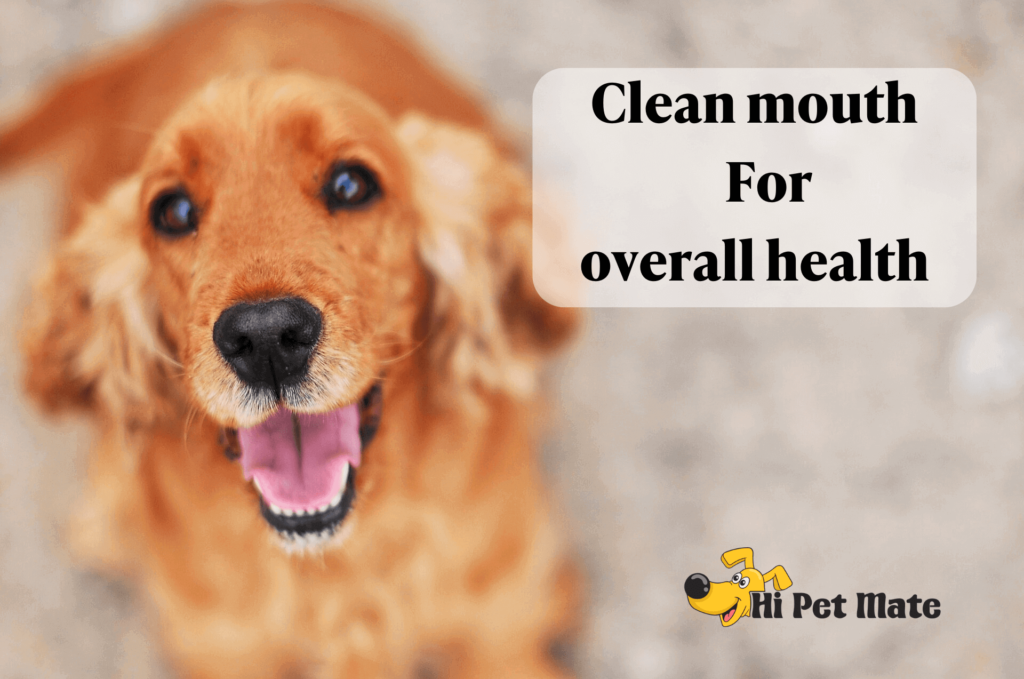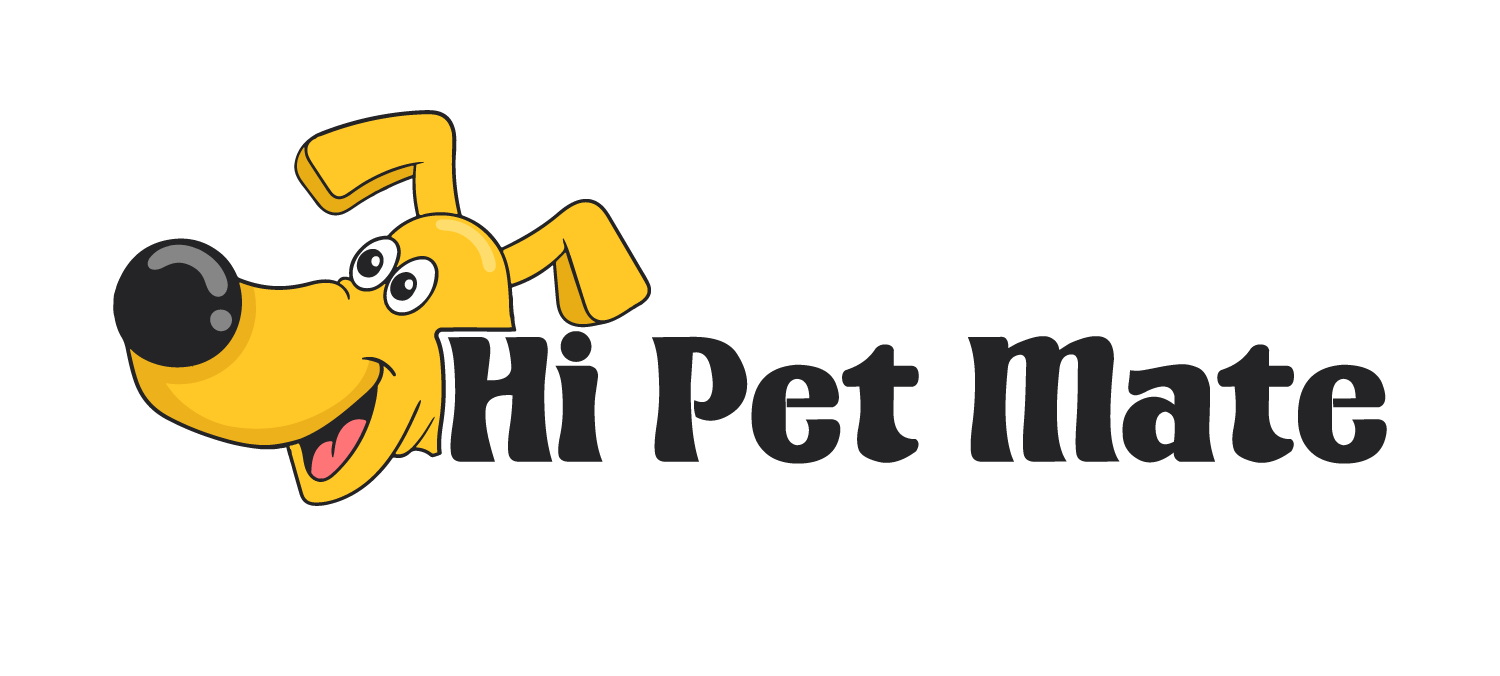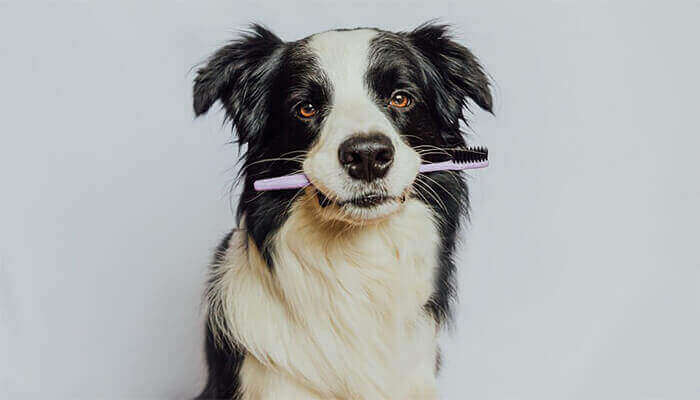To clean a dog’s mouth after eating poop, offer dental chews or brush their teeth. Using dog mouthwash can also help eliminate bacteria and refresh their mouth.
Dogs have a tendency to engage in coprophagy, which is the act of eating feces, leaving pet owners concerned about oral hygiene and health risks. Ensuring your dog has a clean mouth after such incidents mitigates the threat of harmful bacteria and helps maintain dental health.
Giving your furry friend access to safe dental chews aids in mechanically cleaning their teeth and gums. Regular use of a canine toothbrush and toothpaste specially formulated for dogs can provide a thorough cleansing. Opting for dog-specific mouthwash or water additives can also contribute to a fresher mouth and prevent plaque buildup. Adopting these methods not only addresses immediate cleanliness but also serves as a preventative measure for future oral-related health issues.
The Unpleasant Habit: Dogs Eating Poop
Dogs eating poop, or coprophagia, is an unpleasant habit that can shock many pet owners. This behavior might seem gross. Yet, many dogs do it. Understanding why they do it is key. It also helps to know the risks. Most importantly, how to clean a dog’s mouth afterwards becomes essential.
Why Do Dogs Eat Poop?
Several reasons can explain why your furry friend is into this nasty snack. Boredom, anxiety, or health issues could be the cause. Also, some believe it’s linked to instinctual behaviors, or simply because they like the taste. Here are some common triggers:
- Boredom or Stress: Dogs might eat poop to get attention or due to anxiety.
- Instinct: Mother dogs clean their pups by eating their feces.
- Health Issues: Poor digestion might make stool taste like food.
- Diet deficiencies: If lacking in nutrients, dogs may resort to eating poop.
Health Risks Associated With Coprophagia
Eating stool is not only unpleasant, it can also be harmful. Your dog might face these risks:
| Health Risks | Reasons for Risk |
| Parasites | Eating poop can lead to worms or other parasites. |
| Bacterial Infections | Stool might carry harmful bacteria like salmonella. |
| Risks to Humans | Dogs can pass the germs to their human families. |
Initial Response: What To Do Right After Your Dog Eats Poop
When your furry friend decides to snack on something less than appetizing, such as poop, a quick and careful response is crucial. Not only can this habit be unpleasant, but it can also pose health risks. Below are steps to tackle the issue right after the incident occurs.
Remove Your Dog From The Area
The first step is to prevent your dog from eating any more poop. Gently lead or carry your pet away from the area. Distraction can work wonders. Offer a toy or a different activity to shift their focus.
Assessing Your Dog’s Health
After your dog’s unsavory snack, perform a quick health check. Look for signs of discomfort or illness. Check their mouth and face for any residue. If your pet shows adverse symptoms, contact your vet immediately.
- Look for gagging, coughing, or retching
- Monitor for any signs of distress
- Examine their mouth for leftover debris
Ensuring your dog stays in good health is your top priority after this unexpected snack time. Take appropriate measures to clean their mouth and observe their behavior closely over the next few hours.
Preventive Measures: Keeping Your Dog From Poop-eating
Keeping your furry friend from eating poop is crucial for its health. By combining training strategies and dietary changes, you can prevent this unsavory behavior. Let’s delve into effective methods to stop coprophagia, or poop-eating, in dogs.
Training Techniques To Discourage Coprophagia
- Use Command Training: Teach commands like “Leave it” to control your dog’s actions.
- Positive Reinforcement: Reward your dog when it ignores poop with treats or affection.
- Supervised Play: Watch your pet in poop-rich environments and intervene if necessary.
- Immediate Cleanup: Remove poop from your yard promptly to reduce temptation.
Dietary Adjustments And Supplements
Balance Your Dog’s Diet: Ensure your dog’s food meets nutritional needs to reduce cravings.
| Supplement | Benefit |
| Probiotics | Improves gut health |
| Enzymes | Aids digestion |
| Vitamins | Fulfills dietary gaps |
Offer Fibrous Foods: Fiber-rich ingredients can help fill your dog’s stomach and keep them satisfied.
Tools And Supplies You’ll Need For Cleaning
When your furry friend decides that poop is on the menu, quick mouth cleaning becomes a must. Eliminate harmful bacteria and freshen up their breath with the right tools and supplies. Discover what you need to safely and effectively tidy up your dog’s mouth post-poop feast.
Choosing The Right Cleaning Products
Dogs require pet-safe cleaning solutions to protect their health. Start with enzymatic oral cleansers or dog mouthwash specifically formulated for canines. Look for products with natural ingredients, like mint or parsley oils, which are both effective and gentle. Dental wipes or pads can mechanically remove debris and are convenient for quick cleanups. For a deep clean, consider a dog toothbrush and pet-friendly toothpaste. Selecting the appropriate items ensures effectiveness and keeps your dog happy during the process.
Safety Equipment For You And Your Pet
Personal protective gear is essential for this potentially messy job. Keep hands clean and free from bacteria with disposable gloves. Eye protection is wise to prevent accidental splashes. For your pet, a comfortable muzzle might be necessary for safety if they tend to nip. Ensure all items fit properly. Use a calm voice and gentle manner to help your dog remain stress-free during cleaning. Having treats on hand rewards cooperation and builds positive associations with mouth hygiene routines.
- Enzymatic oral cleanser or dog mouthwash
- Natural dental wipes or pads
- Dog toothbrush and pet-friendly toothpaste
- Disposable gloves for hygiene
- Eye protection to safeguard against splashes
- Comfortable muzzle for nippy dogs
- Treats for encouragement
Gather these tools and supplies before cleaning your dog’s mouth for a smooth and effective routine. With the right products and a gentle approach, your dog will have a clean, fresh mouth in no time!
Physical Cleaning: Step-by-step Guide
Dogs sometimes eat things they shouldn’t, including poop. Cleaning their mouth properly afterwards is vital. Here’s how to ensure your furry friend’s mouth remains as clean as can be.
Rinsing The Mouth: How And Why
Rinsing your dog’s mouth helps remove poop particles and bacteria. Use this guide:
- Prepare a rinse solution.
- Mix water with dog-friendly mouthwash.
- Gently open your dog’s mouth.
- Squirt the solution inside, avoiding the throat.
- Ensure your dog spits it out.
Regular rinsing promotes oral health and freshens breath.
Wiping Teeth And Gums: Best Practices
Cleaning your dog’s teeth and gums is crucial. Follow these steps:
- Get a soft cloth or dog tooth wipe.
- Gently rub the teeth and gum line.
- Focus on areas with residue.
- Use circular motions to dislodge debris.
- Reward your dog for their patience.
Oral Hygiene Products For Dogs
Cleaning your dog’s mouth after they eat poop is crucial. Not just for their overall health, but to keep their breath fresh. Thankfully, pet care has evolved to offer a variety of oral hygiene products specifically for dogs. These products range from toothbrushes and toothpastes, to convenient oral wipes and dental sprays. Each has a role in battling the bacteria and eliminating the odor that comes from this unpleasant habit.

Toothbrushes and Toothpastes for Canine Use
Toothbrushes And Toothpastes For Canine Use
Dog-specific toothbrushes are designed to fit snugly in their mouths. Soft bristles ensure gentle cleaning. Canine toothpastes come in flavors dogs love, like poultry or peanut butter. They are safe to ingest—no rinsing necessary. Here are options:
- Finger toothbrushes: For more control and comfort for your pet.
- Double-sided brushes: For different size teeth.
- Enzymatic toothpaste: Breaks down plaque and tartar.
Oral Wipes and Dental Sprays
Oral Wipes And Dental Sprays
Oral wipes are a quick fix to clean your dog’s mouth on the go. You simply wipe the teeth and gums to reduce bacteria. Dental sprays can be used daily. They are easy to apply and help keep breath fresh. Take a look at these benefits:
| Product Type | Main Benefit |
| Oral Wipes | Directly clean teeth and gums. |
| Dental Sprays | Reduce bacteria, freshen breath. |
Natural Remedies For A Fresh Mouth
Discovering your furry friend indulging in poop is a distressing moment. Not only is it unsanitary, but it also leaves their mouth with an unpleasant odor and potentially harmful bacteria. Fortunately, natural solutions can help restore your dog’s fresh breath and support overall oral hygiene.
Homemade Mouthwashes
Refreshing and easy to make, homemade mouthwashes provide a quick fix to bad breath caused by your dog’s unexpected snack. Here are some options:
- Apple Cider Vinegar: Mix one part water with one part apple cider vinegar. it’s a natural antibacterial agent that helps keep the mouth clean.
- Coconut Oil Solution: Melt a tablespoon of coconut oil in warm water. Coconut oil fights germs and reduces nasty odors.
- Parsley Water: Boil parsley leaves in water and allow it to cool. Parsley is known for its freshness.
Rub the chosen solution on your dog’s gums and teeth with a soft cloth or dog toothbrush.
Chew Toys And Dental Treats
Toys and treats specifically designed for dental health provide a fun way to clean your dog’s mouth. They encourage natural chewing behaviors, which is essential for mechanical cleanup. Consider these options:
| Dental Toy/Treat | Benefits |
| Rubber Chew Toys | Massage gums, scrape off plaque |
| Dental Chews | Infused with enzymes to break down tartar |
| Rope Toys | Act like floss, remove debris between teeth |
Select toys based on your dog’s size and chewing habits. Always supervise your dog during chew time to ensure safety.
Understanding Behavior: Why Mouth Cleaning Is Important
Understanding behavior is vital when tackling the issue of a dog consuming feces. Cleaning their mouth after such incidents goes beyond the obvious health concerns. This action can influence not only your dog’s health but also its psychological well-being and the bond you share.
Psychological Effects On Your Dog
Careful mouth cleaning helps prevent infections that could affect your dog’s mental state. A dog with a clean mouth is happier and more relaxed. Below are key points to understand:
- Prevents bad breath that can cause discomfort
- Reduces the risk of germ transmission
- Encourages positive reinforcement and training
Bonding Through Grooming
Grooming is not just about physical health; it’s a chance to strengthen your connection with your canine friend. Mouth cleaning is a grooming ritual that can reinforce trust. Consider these grooming moments:
- Gentle brushing can be a calming experience
- Regular grooming sessions increase bonding
- Positive interactions foster a strong relationship
Long-term Solutions: Improving Oral Hygiene
Tackling the unpleasant aftermath of your dog’s poop-eating habits calls for a solid, long-term oral hygiene strategy. Maintaining a fresh and clean canine mouth isn’t just about the immediate cleanup—it’s about crafting a consistent care routine that promotes overall health. Below are key steps to ensure your furry friend’s mouth stays as hygienic and fresh-smelling as possible.
Regular Dental Checkups
Your dog’s teeth need expert care just like yours do. Yearly visits to the vet for a dental checkup can spot early signs of oral health issues. The veterinarian can professionally clean your dog’s teeth, removing plaque and tartar build-up that brushing at home can’t tackle.
Establishing A Routine For Oral Care
Consistent oral care at home is vital. Start by selecting the right tools: a dog-friendly toothbrush and toothpaste. Brushing daily is best, but aim for at least three times a week. Here’s a simple step-by-step guide:
- Begin slowly to get your dog used to the sensation.
- Use circles or gentle strokes on each tooth.
- Don’t forget the gum line, where bacteria often hide.
- Praise your dog throughout, making it a positive experience.
Chew toys and dental treats also help reduce plaque. Invest in ones specifically designed for dental health. They work to clean teeth through natural chewing action.
| Action | Purpose |
| Brushing Teeth | Removes plaque and bacteria |
| Dental Treats | Supplements brushing; satisfies chewing needs |
| Veterinary Checkups | Professional oversight and cleaning |
Water additives are another option. Select ones that are vet-approved to help keep your dog’s mouth clean without brushing. Simply add to your pet’s drinking water.
Challenges And Solutions In Cleaning Your Dog’s Mouth
As a pet owner, ensuring your dog’s oral hygiene can be challenging, especially after they perform the less-than-appetizing act of eating poop. Dogs are notorious for their love of exploring with their mouths, which includes ingesting items that can host harmful bacteria. This brings about the need for effective strategies to clean their mouths and maintain their oral health.
Dealing With Uncooperative Dogs
Some dogs dislike mouth cleaning. This resistance can turn a simple task into a struggle. Patience and positive reinforcement are key.
To start:
- Introduce oral hygiene slowly.
- Use dog-friendly toothpaste for an appealing taste.
- Associate cleaning with rewards, like treats or playtime.
Consistency overcomes resistance. Regular cleaning sessions will help your dog get used to the routine, making it easier over time.
Creative Approaches To Oral Cleaning
Traditional brushing can be tough on both owners and pets. Alternative methods can make the process enjoyable and effective.
- Dental chews: These are specially designed to clean teeth while the dog chews.
- Water additives: Just add to your dog’s drinking water for effortless cleaning.
- Wipe wraps: Use a clean cloth wrapped around a finger to gently rub the teeth and gums.
Each approach offers a practical solution to maintain your dog’s dental hygiene after unwanted snacking adventures.
Professional Help: When To Consult A Veterinarian
Professional Help: When to Consult a Veterinarian is essential if your canine companion’s stool-eating habit persists or leads to dental health concerns. Dogs sometimes eat poop due to various reasons including nutritional deficiencies, boredom, or underlying health issues. If the situation doesn’t improve with home care, seeking expert advice ensures your dog’s health stays on track.
Persistent Coprophagia
Regularly cleaning your dog’s mouth after it eats poop is crucial, but sometimes, the habit continues despite your best efforts. It’s vital to recognize when this behavior warrants a visit to the vet:
- Nutritional imbalance that requires professional assessment
- Behavioral issues that might need a specialist’s intervention
- Any health problems that cause this behavior
These factors contribute to your dog’s repetitive actions and should be addressed by a vet.
Signs Of Dental Issues Needing Professional Care
While most dental care can be done at home, certain signs indicate the need for a veterinarian’s attention:
- Bad breath that persists even after cleaning
- Red or swollen gums, a sign of potential gum disease
- Loose or broken teeth, which may cause pain and infection
- Any discomfort when eating or chewing
If these symptoms appear, professional dental care for your dog is non-negotiable.
Frequently Asked Questions Of How To Clean Dogs Mouth After Eating Poop
Why Do Dogs Eat Poop And Need Mouth Cleaning?
Dogs may eat poop due to various reasons including nutritional deficiencies, boredom, or a condition called coprophagia. Cleaning their mouth afterward is crucial to prevent bacterial spread and maintain oral hygiene.
What Is The Best Way To Clean A Dog’s Mouth?
The best way to clean a dog’s mouth is by using dog-specific toothpaste and a toothbrush. Regular brushing can control the buildup of plaque and reduce the risk of dental issues. Dental wipes and water additives are good alternatives.
How Often Should I Clean My Dog’s Mouth?
Ideally, you should clean your dog’s mouth daily, especially if they’ve consumed feces. Consistent dental care routines are essential for preventing oral diseases and ensuring overall health.
Can Certain Foods Help Clean A Dog’s Mouth?
Yes, certain foods can help clean a dog’s mouth. Dry kibble and specially-formulated dental chews can assist in removing plaque and tartar buildup, promoting better oral health.
Conclusion
Keeping your dog’s mouth clean is crucial, especially after an incident of eating poop. Regular dental hygiene practices and vet-approved products can ensure your furry friend’s oral health. Remember, quick action combined with consistent care is your best defense against potential issues.
Show love for your pooch by prioritizing a clean, healthy mouth.

